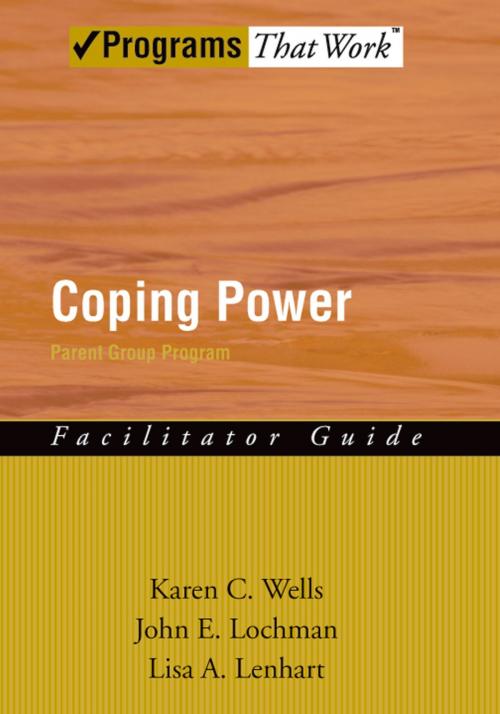Coping Power
Parent Group Facilitator's Guide
Nonfiction, Health & Well Being, Psychology, Clinical Psychology, Medical| Author: | Karen Wells, John E. Lochman, Lisa Lenhart | ISBN: | 9780190450007 |
| Publisher: | Oxford University Press | Publication: | March 18, 2008 |
| Imprint: | Oxford University Press | Language: | English |
| Author: | Karen Wells, John E. Lochman, Lisa Lenhart |
| ISBN: | 9780190450007 |
| Publisher: | Oxford University Press |
| Publication: | March 18, 2008 |
| Imprint: | Oxford University Press |
| Language: | English |
The Coping Power Program is designed for use with preadolescent and early adolescent aggressive children and their parents and is often delivered near the time of children's transition to middle school. Aggression is one of the most stable problem behaviors in childhood. If not dealt with effectively, it can lead to negative outcomes in adolescence such as drug and alcohol use, truancy and dropout, delinquency, and violence. This program has proven effective in helping to avoid these types of problems. The parent component of the program consists of 16 group meetings also held during the 5th and 6th grade school years. Parents are taught ways of reinforcing their children's positive behaviors, as well as effective discipline techniques for eliminating negative behaviors. Skills for improving family communication, providing academic support in the home, and building family cohesion are also a focus. Parents also learn how to give effective instructions and establish age-appropriate rules and expectations for their children at home. In addition to these basic parenting skills, the program describes relaxation techniques that parents can use to deal with their own stress. Tips for taking care of personal needs and effective time management strategies also help to ease the challenges of parenting an aggressive child.
The Coping Power Program is designed for use with preadolescent and early adolescent aggressive children and their parents and is often delivered near the time of children's transition to middle school. Aggression is one of the most stable problem behaviors in childhood. If not dealt with effectively, it can lead to negative outcomes in adolescence such as drug and alcohol use, truancy and dropout, delinquency, and violence. This program has proven effective in helping to avoid these types of problems. The parent component of the program consists of 16 group meetings also held during the 5th and 6th grade school years. Parents are taught ways of reinforcing their children's positive behaviors, as well as effective discipline techniques for eliminating negative behaviors. Skills for improving family communication, providing academic support in the home, and building family cohesion are also a focus. Parents also learn how to give effective instructions and establish age-appropriate rules and expectations for their children at home. In addition to these basic parenting skills, the program describes relaxation techniques that parents can use to deal with their own stress. Tips for taking care of personal needs and effective time management strategies also help to ease the challenges of parenting an aggressive child.















